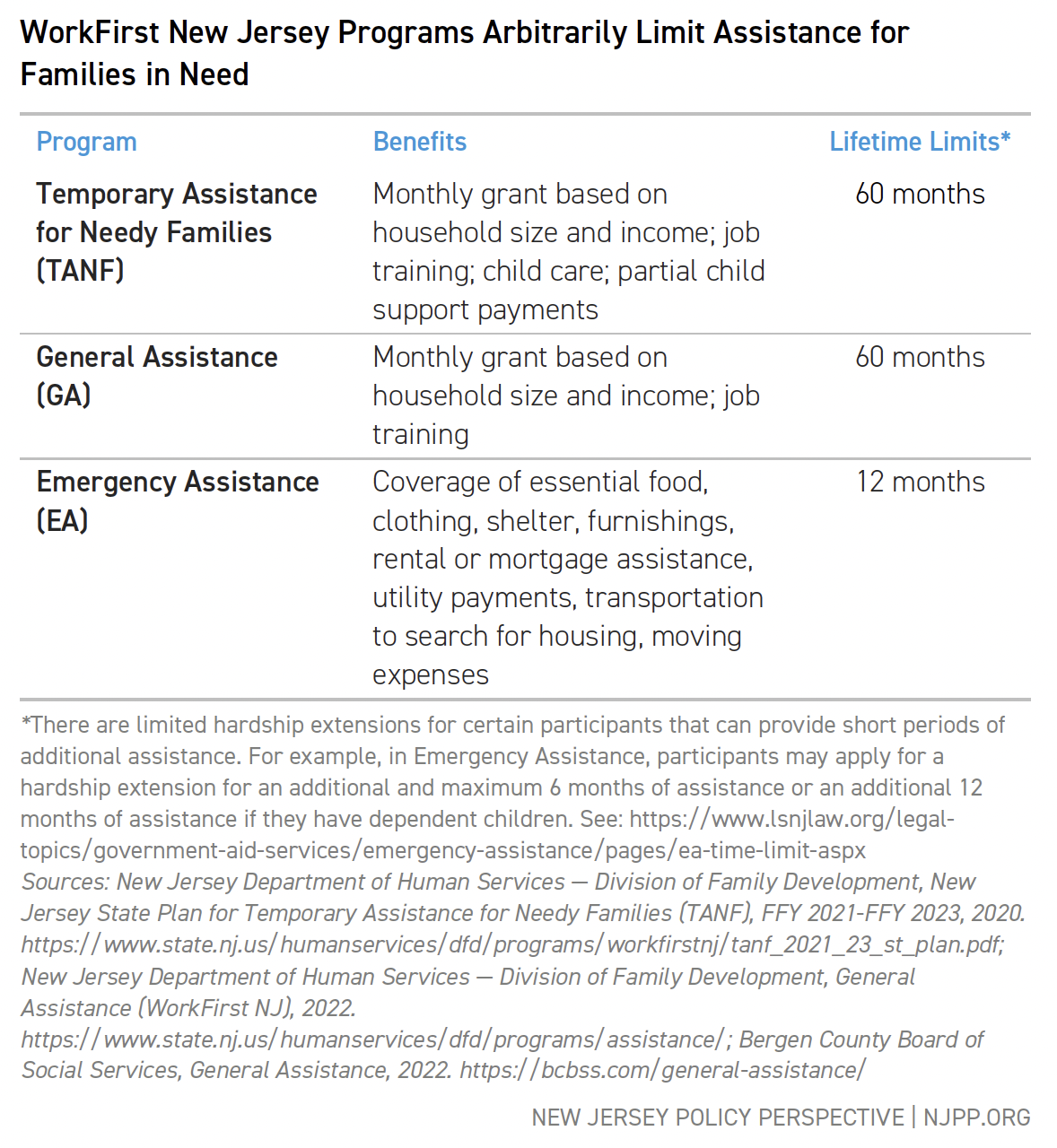Thousands of low-income families across New Jersey could lose vital cash support in February unless lawmakers extend a provision in the state’s Emergency Assistance program that eased restrictive limits on benefits.[i] A lifeline for families who fall on hard times and risk losing their housing, Emergency Assistance provides direct support to cover the costs of back rent or mortgage payments, utilities, food, clothing, and more to protect residents from the harmful effects of poverty and homelessness.
Like many other cash assistance programs for low-income families, Emergency Assistance is an effective anti-poverty tool that is undermined by outdated and punitive restrictions implemented during the welfare reform movement of the 1990s, including arbitrary lifetime limits on benefits. In 2018, state lawmakers recognized that the 12-month lifetime limit on Emergency Assistance was overly restrictive and created new exemptions for families facing the greatest barriers to stable housing and a secure income. However, the exemptions in this law are temporary and are set to expire in February 2024 unless lawmakers act fast.
The 2018 law lifted the lifetime limit for residents who are: living with a disability; full-time caretakers of children or dependents with disabilities; over 60 years old; receiving Supplemental Security Income (SSI); or facing persistent barriers to employment.[ii] During the current lame duck session, New Jersey lawmakers and Governor Murphy can make sure these low-income residents and their families continue to qualify for the cash support they need by enacting S3960/A5549 and maintaining the exemptions to lifetime limits on Emergency Assistance implemented five years ago.
Arbitrary Time Limits on Cash Assistance are Punitive and Harmful for Low-Income Families
The time limits in New Jersey’s cash assistance programs within Work First New Jersey (WFNJ) are not grounded in evidence but come from outdated and discriminatory stereotypes from the 1990s welfare reform movement.[iii] Lifetime limits on benefits, like the 12-month limit in Emergency Assistance, set arbitrary cutoffs for people who often still need assistance and face an imminent risk of losing their housing. This punitive approach means that assistance is not provided when it is needed most, further contributing to the cycle of poverty and making it harder for families to build a strong foundation and invest in their future.[iv]
Emergency Assistance benefits provide additional support to families participating in other WorkFirst New Jersey programs — Temporary Assistance for Needy Families (TANF) and General Assistance — during crisis situations so they can stay housed, fed, and clothed. The assistance ranges in dollar amounts depending on the circumstances, and families can apply for each month they are in need for up to 12 months total. Continuation of benefits requires regular re-assessments of the participant’s need and development of a plan for recovery.[v] Despite its role in filling a critical gap in the state’s cash support system, Emergency Assistance has the shortest lifetime limit of the WorkFirst New Jersey programs, so most participants are only eligible for one-fifth of the total time they are allowed to access other programs.[vi]

In Fiscal Year 2023, more than 5,700 residents receiving TANF and General Assistance each month also received Emergency Assistance benefits, representing roughly 13 percent of recipients,[vii] with an average grant of $1,032 per month.[viii] Thousands of these families received Emergency Assistance every year due to the 2018 law, further demonstrating how more families can get the support they need without lifetime limits in effect.[ix] With the harm of the pandemic still felt throughout the state and far too many families living in poverty, this additional assistance is essential for low-income families.
Unless lawmakers act soon and pass S3960/A5549, New Jersey risks slipping backward in its support for low-income families. There is no sound policy rationale to maintain arbitrary and outdated lifetime limits on assistance, and this lame duck session is an opportunity to strengthen cash assistance programs and create the robust safety net that New Jersey families deserve.
End Notes
[i] NorthJersey.com, Most vulnerable could become homeless if NJ Legislature fails to extend aid, advocates say, 2023. https://www.northjersey.com/story/news/2023/11/21/vulnerable-could-end-up-homeless-if-nj-legislature-fails-to-extend-aid-shelters/71657027007
[ii] Legal Services of New Jersey, Emergency Assistance and Time Limit Extensions, 2022. https://www.lsnjlaw.org/legal-topics/government-aid-services/emergency-assistance/pages/ea-time-limit-aspx; New Jersey Department of Human Services, Work First New Jersey Emergency Assistance Training, 2019. https://www.nj.gov/humanservices/dmhas/information/provider/Provider_Meetings/2019/DMHAS%20EA_080119_SJM.pdf; N.J. Stat. § 44:10-51 (3). https://casetext.com/statute/new-jersey-statutes/title-44-poor/chapter-4410-reference-to-county-welfare-board-to-mean-reference-to-county-welfare-agency/section-4410-51-provision-of-emergency-assistance
[iii] Center on Budget and Policy Priorities, TANF Policies Reflect Racist Legacy of Cash Assistance, 2021. https://www.cbpp.org/research/income-security/tanf-policies-reflect-racist-legacy-of-cash-assistance. Congressional Research Service, The Temporary Assistance for Needy Families (TANF) Block Grant: A Legislative History, 2023.https://sgp.fas.org/crs/misc/R44668.pdf
[iv] Center on Budget and Policy Priorities, Three Reasons Why Providing Cash to Families With Children Is a Sound Policy Investment, 2022. https://www.cbpp.org/research/income-security/three-reasons-why-providing-cash-to-families-with-children-is-a-sound
[v] New Jersey Department of Human Services, Work First New Jersey Emergency Assistance Training, 2019, pg. 18-19. https://www.nj.gov/humanservices/dmhas/information/provider/Provider_Meetings/2019/DMHAS%20EA_080119_SJM.pdf
[vi] New Jersey Department of Human Services, Work First New Jersey Emergency Assistance Training, 2019, pg. 25. https://www.nj.gov/humanservices/dmhas/information/provider/Provider_Meetings/2019/DMHAS%20EA_080119_SJM.pdf
[vii] NJPP Analysis of New Jersey Treasury – Office of Management and Budget, Governor’s FY2024 Detailed Budget, 2023, pg. D-224. https://www.nj.gov/treasury/omb/publications/24budget/FY2024BudgetDetail-Full.pdf
[viii] New Jersey Treasury – Office of Management and Budget, Governor’s FY2024 Detailed Budget, 2023, pg. D-224. https://www.nj.gov/treasury/omb/publications/24budget/FY2024BudgetDetail-Full.pdf
[ix] New Jersey Office of Legislative Services, Legislative Fiscal Estimate for S866, 2018. https://pub.njleg.state.nj.us/Bills/2018/S1000/866_E2.PDF

